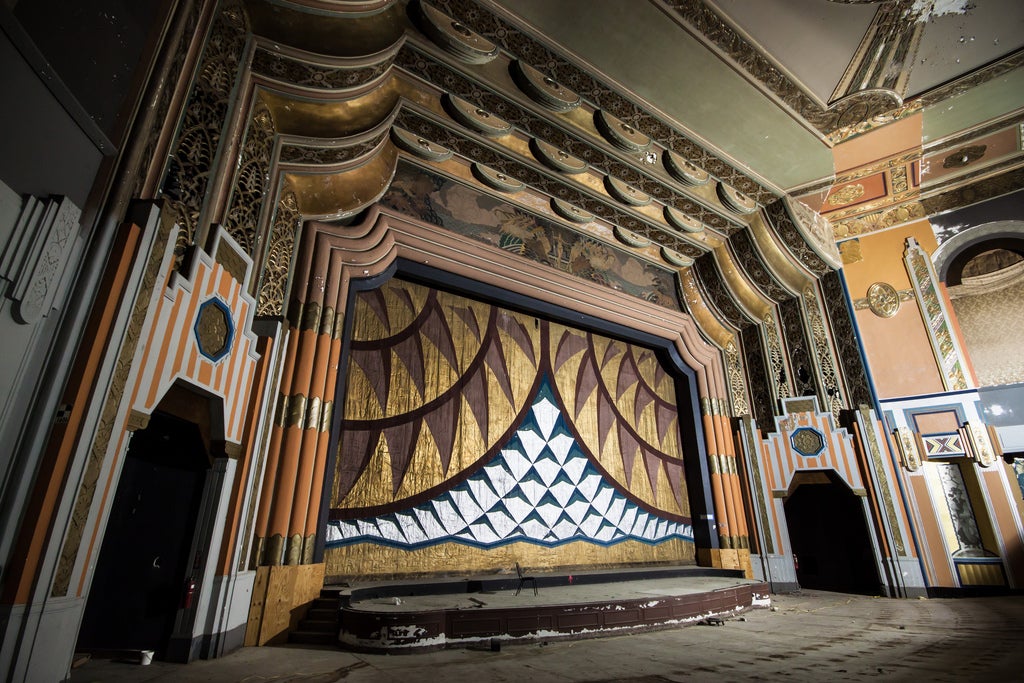Historical Commission rejects efforts to save Boyd

The Philadelphia Historical Commission approved a hardship application from the owners of the historic Boyd Theater on Chestnut Street on Friday, allowing developer Neal Rodin to demolish all but the facade and build a new movie theater on the property.
The decision came after more than four hours of testimony from representatives of the applicant, nearby neighbors who support the new development, and members of Friends of the Boyd, a group that has advocated for the theater’s preservation.
After the vote, preservation advocates began to chant, “Save the Boyd!” But the chanting subsided quickly, and the Commission asked attendees to continue their conversations outside, as it hadn’t gotten through its agenda yet.
The exterior of the Boyd Theater was placed on the city’s historic register in 2008, but its interior was never designated historic. Chairman Sam Sherman repeatedly reminded witnesses on Friday that the interior of the theater is beyond the Commission’s legal purview.
The theater has been vacant since 2002, and has been the subject of a handful of proposals for reuse during that time. None of those proposals has panned out.
At issue in Friday’s meeting was whether the applicant had proved that there was a financial hardship for the historic structure. The Historical Commission may only approve demolition of historic buildings in service of the public interest or, in the case of hardship, if it finds that “the building, structure, site, or object cannot be used for any purpose for which it is or may be reasonably adapted,” according to the city’s preservation ordinance.
In order to prove hardship, applicants must show that “the sale of the property is impracticable, that commercial rental cannot provide a reasonable rate of return, and that other potential uses of the property are foreclosed.”
Friends of the Boyd recently secured an anonymous offer of $4.5 million for the group to purchase the theater. Preservation advocates tried to use that offer as proof that there was no hardship for the property.
“The applicant has an affirmative obligation to attempt the sale of the property,” said Carolyn Boyce, director of the Preservation Alliance, testifying in opposition to the hardship application. “There is an offer on the table. Case closed.”
Matt McClure, an attorney for the developer, said that the anonymous offer doesn’t prove there is no financial hardship on the building.
Some residents of the neighborhood surrounding the Boyd testified in support of the application, saying that the vacant theater is blight that attracts vandals and vermin.
“I try to walk to nice restaurants at night and there’s bums urinating out front,” said one owner of a nearby business.
Sharon Pinkenson, director of the Philadelphia Film Office, testified in support of the hardship application. Pinkenson said that she was a founder of the group that became Friends of the Boyd, and had supported its preservation for years. But she no longer believes that type of theater is viable. The Rodin plan for an eight-screen movie complex with a preserved and fully restored facade is the best option for the Boyd, Pinkenson said.
In the end, Dominique Hawkins was the only member of the Historical Commission to vote against the demolition. She had suggested postponing the decision for six months to see whether the Friends of the Boyd plan was viable. Chairman Sam Sherman abstained from the vote.
Howard Haas of the Friends of the Boyd said the group will appeal the Historical Commission’s decision to the Board of Licenses and Inspections Review.
Stay tuned.
BOYD REDEVELOPMENT TIMELINE
May 2002 – March 2003: Goldenberg Development Corporation explored reuse strategies (concert venue, dinner theater, special event space, offices and classrooms for the Pennsylvania Ballet).
September 2003: Goldenberg and Clear Channel announce partnership to restore the Boyd as a theater for first-run Broadway touring productions. Goldenberg was unable to secure public funding toward this project.
March 31, 2005: Goldenberg sold the Boyd to Boyd Development LP, a subsidiary of Clear Channel, then Live Nation. Live Nation continued the attempted redevelopment of the Boyd as a theater for touring Broadway shows. Live Nation, however, sold its theatrical division, stalling out on redeveloping the Boyd.
August 2008: Historical Commission votes to list the Boyd in the Philadelphia Register of Historic Places.
August 2008 – January 2010: Hal Wheeler of ARCWheeler advanced redevelopment strategy which would have preserved the Boyd and added a 28- story, 250-room hotel on the adjoining lot that would have cantilevered over the Boyd’s auditorium. Hal Wheeler passed away in January 2010.
2010: Live Nation considered renovating the Boyd into a 2,200-capacity standing general admission live entertainment venue for touring live music acts. Live Nation determined it could not justify the rehabilitiaton in light of anticipated revenues.
January – April 2011: 1910 Chestnut LP advanced a mixed-use redevelopment plan, but the group was not able to secure investment partners or finalize the development plan.
October 2012: Live Nation and International Finance Company (as R Investment Nine LP) entered into agreement of sale for the Boyd. R Investment Nine has a ground lease agreement with 30 West Pershing LLC which has sub-groundleased with iPic. R Investment Nine is the project developer and owner; iPic would be the tenant and operator. The current proposal is to construct an eight-screen movie theater behind the Chestnut Street facade and headhouse.
January-February 2014: Committee on Financial Hardship accepts Boyd owner’s application for hardship.
Source: RES Report 1/16/14
WHYY is your source for fact-based, in-depth journalism and information. As a nonprofit organization, we rely on financial support from readers like you. Please give today.



